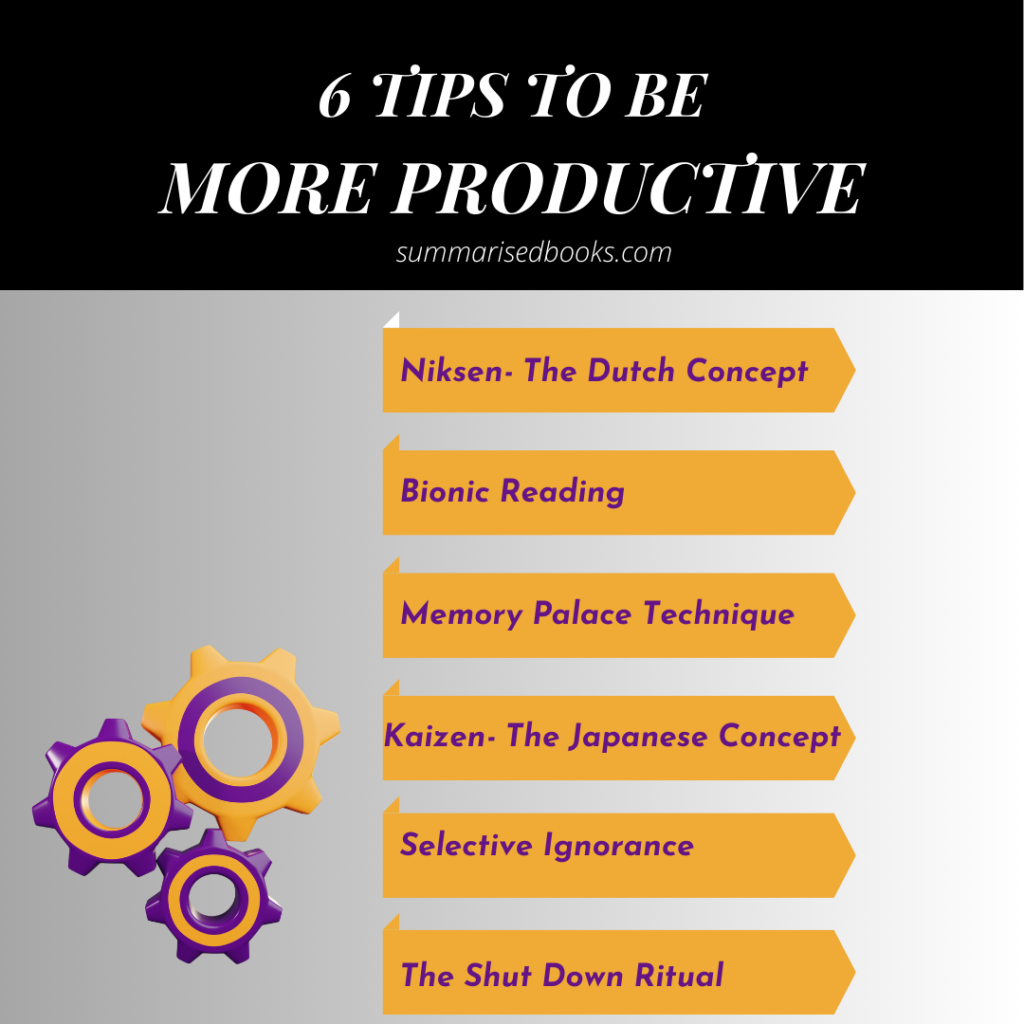
People are in search of methods to do their work efficiently and manage their life better, especially when they have too much to do and are feeling stressed. The article will elaborate six different ways that can make your work better and make you a more valuable person. These are:
- Niksen- The Dutch Concept
- Bionic Reading
- Memory Palace Technique
- Kaizen- The Japanese Concept
- Selective Ignorance
- The Shut Down Ritual
Let’s begin:
1. Niksen- The Dutch Concept
Niksen means to just relax without doing anything specific, not being lazy but choosing to not engage in any activity. It’s about giving yourself time to just be, which can lead to new ideas and solutions to problems.
Albert Einstein, the famous physicist, often did this. He would take time to relax, which helped him think of new ideas and contributed to his success in physics.
Taking breaks to do nothing can help prevent stress and keep your mind fresh. A study from the University of Konstanz in Germany showed that taking short breaks can help your brain recover its focus, which is good for your mental health and helps you work better. Regular short breaks can also keep your performance steady.
Here’s how you can practice Niksen:
- Plan to take short breaks for Niksen throughout your day. This could be just sitting quietly, looking out the window, or walking slowly without a goal.
- During these breaks, don’t use your phone or do any particular activity. Let your thoughts go wherever they want.
- Make it a regular part of your day, even if it’s just for a few minutes. These quiet moments can really help refresh your mind.
Niksen goes against the idea that we need to be busy all the time. It shows us that taking time to do nothing can be really good for our creativity, mental health and overall happiness.
2. Bionic Reading
Reading hasn’t changed much over time, and we rarely think about improving it. Bionic Reading is a new method that could make you read faster and remember more. Created by Renato Casutt, a Swiss designer, Bionic Reading changes how words look to help you focus on the most important parts. It’s like a guide for your eyes, making reading less tiring and more focused.
Here’s how it works:
We don’t read every letter; our brains recognize whole words quickly. Bionic Reading emphasizes the first few letters of words, helping your brain understand the rest faster.
Bionic Reading offers a new way to read. Give it a try; it might change how you read forever.
3. Memory Palace Technique
We often depend on digital devices for reminders and notes, but it’s crucial to keep our memory sharp because:
- Relying too much on technology can make our memory weaker.
- Studies have found that using tech for certain tasks, like GPS for directions, can lessen our ability to remember things.
- Posting everything online can make it harder for us to remember those events ourselves.
To improve our memory, we can use the Memory Palace Technique, which has been around since ancient Greek and Roman times. It involves linking information to places we know well, which helps us remember better.
Here’s how to do it:
- Pick What to Remember: This could be anything from numbers to grocery items.
- Choose a Place You Know: Like your house or a childhood spot.
- Plan a Mental Walk: Imagine walking through this place and use specific spots as reminders.
- Turn Info into Images: Make up funny or strange pictures in your mind to represent the things you want to remember.
- Visit Often: Go over your Memory Palace in your mind to keep your memory strong.
Joshua Foer wrote about how he improved his memory using this method in “Moonwalking with Einstein.” It shows that anyone can get better at remembering things with practice. So, instead of always using your phone for reminders, try adding them to your Memory Palace.
4. Kaizen- The Japanese Concept
Kaizen is a Japanese concept that means making small, steady steps to see big improvements over time. It’s all about getting better bit by bit, in your personal life or at work.
Masaaki Imai made this idea more popular with his book, “Kaizen: The Key to Japan’s Competitive Success” showing that it’s not just for factories but can help anyone achieve their goals without feeling overwhelmed.
Here’s how you can use Kaizen in everyday life:
- Learn a Little Every Day: Spend a little time each day learning something new in your job area. It could be reading, watching a video, or trying out a new tool.
- Start Small with Exercise: Don’t change your whole workout at once. Begin with a few extra minutes of exercise each day and slowly do more as you feel ready.
- Watch Your Wallet: Keep an eye on what you spend for a week. Find one small thing to save on, like making your own coffee, and go from there.
- Keep Your Space Tidy: Clean up your work area for five minutes every day. This small step can make your space neat and help you work better.
- Be Kind Every Day: Make your relationships better with a small act of kindness each day, like a nice message, a compliment, or focused time together.
Once you start using Kaizen in one part of your life, you’ll see how it can help in many other areas. It gives you the power to make small, ongoing improvements that add up over time.
5. Selective Ignorance
A study from the University of California, San Diego, shows we take in about 100,500 words every day outside of work. With so much info coming at us, it’s key to choose what we pay attention to.
“Selective ignorance” means intentionally ignoring stuff that isn’t helpful. It’s about filtering out distractions to focus on what’s important. It’s not about ignoring things for no reason, but deciding what’s worth your mental effort.
Selective ignorance helps reduce stress and keep you focused. Dr. Gloria Mark, an informatics professor, found that too much digital info and interruptions can make us stressed and distract us. Ignoring unhelpful digital info can help us stay focused and do deep, meaningful work.
Here are ways to practice selective ignorance:
- Choose What You Follow: Stop following social media that’s just noise. Pick newsletters, podcasts, and news that really add to your life.
- Control Your News Time: Only check the news at certain times and from a few reliable sources to avoid feeling swamped.
- Learn When You Need It: Learn things when they’re immediately useful, not just in case you might need them someday. This makes sure what you learn is relevant and used right away.
- Be Mindful Online: Think about how you use the internet and social media. If you’re just wasting time, try doing something more worthwhile.
- Check Your Info Diet: Every so often, think about the info you’re taking in. Drop any topics, subscriptions, or habits that aren’t helping you anymore.
Selective ignorance is about not letting useless info take up your time and energy. It’s about focusing on what really matters and ignoring the rest.
6. The Shut Down Ritual
It can be tough to keep work and personal life separate, especially when work messages are always just a click away. Mixing them up too much can stress you out and cause other problems. A study in the Journal of Vocational Behavior found that not having a clear line between work and personal time can really affect your mental health.
The best way to handle this is to have a “Shut Down Ritual” at the end of the day. This idea comes from Cal Newport’s book “Deep Work”. It’s about having a set routine to wrap up your workday and get ready for personal time. It’s not just finishing up tasks; it’s also about getting your mind ready to leave work at work.
Here’s what a “Shut Down Ritual” might look like:
- Take the last bit of your workday to look over what you did and make a quick plan for tomorrow. This helps you mentally finish up today’s work.
- Cleaning up your desk and turning off your computer marks the end of your workday.
- Use a phrase like “Shutdown complete” to tell yourself work is done. It might seem odd, but it’s a strong way to let your brain know it’s time to relax.
- Do an activity that helps you switch from work mode to personal time, like a walk or a hobby.
Having a “Shut Down Ritual” is key to balancing work and life. Research shows that it can make you happier with your job and less likely to burn out. Doing this ritual every day helps you disconnect better, leading to a more chill evening and a refreshed start the next day.
A “Shut Down Ritual” is more than just a way to be productive. It’s about taking care of yourself and showing that your personal time is just as important as your work time.
Practice these simple techniques for 3 weeks and feel a valuable difference in your life.
Good Luck!
Disclosure: The above strategies have been extracted from Ali Abdaal‘s “Daily Productivity” email series.
Refer Related Content:
- How to be More Productive in Work and Life: 8 Proven Ways
- How to Increase Confidence & Self-Esteem-A 5 Step Formula
- How to Improve Self Awareness for Personal Growth
- How to Delegate Tasks as a Leader
- 14 Essential Traits of a Great Leader and How to Develop Them
- 5 Most Effective Time Management Strategies to Enhance Personal Productivity
Refer Related Book Summaries:
- Solving the Procrastination Puzzle
- The Slight Edge
- The One Thing
- Atomic Habits
- The Compound Effect
- Creating Communication
- How to Talk to Anyone


That is wonderful information, by giving proven techniques used by great persons of the world including Einstein, I also wrote about mnemonic techniques of learning, which may be read at
https://amjadinsights.blogspot.com/2023/12/mnemonics-techniques.html